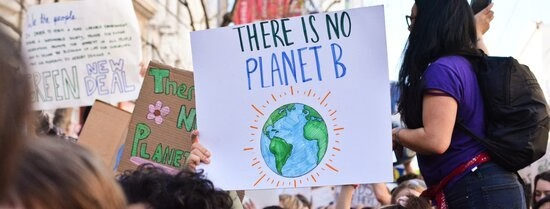Working with young people to find solutions to social problems. That is what psychologists Suzanne van de Groep and Lysanne te Brinke do together with the YoungXperts team. At the moment, they are focusing on the climate crisis. 'The topic is very much alive among young people, more than 75 per cent are concerned', says Suzanne.
We hear a lot about the climate crisis, but we don't often hear what young people think about it. While they are the ones most affected by the consequences of climate change. 'In addition, young people are particularly susceptible to anxiety about this topic partly because of changes in the brain in the teenage years', Van de Groep says.
On the other hand, there are also young people who have never thought about climate. 'That can have all kinds of reasons. For example, because in poor families there are other problems. Then there is little room to deal with climate. That's why we engaged in 11 brainstorming sessions with 114 young people, to find out exactly how this topic resonates with young people', says Te Brinke.
The results were compiled in the manifesto "Young people's perspectives on the climate crisis" (in Dutch: "Jongerenperspectief op de klimaatcrisis"). On 11 June 2024, the scientists presented the manifesto to the then Minister for Climate and Energy Rob Jetten. View the manifesto online (in Dutch).

Struggling despite stress
The more young people worry about the climate, the lower their wellbeing, and the more worried they are about the future. On the other hand, the researchers noticed that young people are very keen to get involved, and that it can also offer them strength. Lysanne: 'Young people really do make a difference. We know from research that they are very good at thinking outside of the box and that they can effectively motivate their parents to do something for a better climate'.
Through questionnaires and brainstorming sessions with young people, the YoungXperts team scientists gathered all the information. Suzanne: 'We were interested in the thoughts and ideas that young people have. That's what the research is based on, the experiential world of young people.'
Two concrete action points emerge from the study:
- Young people want a youth parliament or generational test, so that it can be tested whether upcoming generations who are not yet allowed to vote agree with policies.
- Young people want climate education to become a regular feature at all secondary schools. No matter what level and with attention to an integrated approach. For example, not just learning about climate in geography, but also thinking about problems and coming up with solutions from multiple subject areas.

Better together
In the survey, many young people indicated that something needs to be done against climate change. But what? 'Young people see tackling climate problems as a joint process. They do not want to bear the brunt of all the problems on their own and instead get energy from working together. Almost 75 per cent of those surveyed say that we as a society bear the responsibility. They think of more climate rules for companies, producing more renewable energy and more space for nature. Only 25 per cent think that, above all, we should do more ourselves. Such as consume less, fly less and eat less meat', said Te Brinke. 'For young people, that sometimes feels like a drop in the ocean'.
'Working together also makes young people feel better. On the subject of waste separation, we saw that too. Young people told us that they prefer to work together rather than individually. You then feel part of a bigger picture, you feel you make more impact and that also makes it more fun to work for a better climate'.
Climate education for young people
Young people say they learn little about the climate crisis at school. And when it comes to it, it does not connect well with their perceptions. Lysanne: 'Now nitrogen comes back in biology or geography class. But that is often very technical. Take a concrete subject. For example, what we should do if a large part of the Netherlands is flooded? That appeals to young people's perceptions'.
Another tip from the young people themselves: go on a field trip! 'Companies or agencies then explain what they are doing for the climate. This in turn relieves teachers, because we can also see that you cannot place all the responsibility for changes in education on teachers. They are busy enough as it is.'
Stay positive
The scientists hope that policymakers can start working with their advice. The manifesto with all the recommendations is there. 'Policymakers often know which pillars they want to work with. What they don't know so well is how to involve young people in such initiatives and include their voices. Hopefully our manifesto will help with that', says Van der Groep.
Te Brinke emphasises to stay mostly positive in initiatives. 'Fear can have a paralysing effect. Young people may end up feeling desperate or despondent. And they certainly don't take action if they feel they can't do anything about it anyway.'
- More information
How do adolescents develop into people who contribute to society? In the Erasmus SYNC lab, we investigate the dynamic development of adolescents' brains. More about Erasmus SYNC lab
How do you make choices as a young person? Why do some succeed better than others? That is what we are trying to understand with YoungXperts. YoungXperts is an initiative of the SYNC lab. More about YoungXperts (in Dutch)
On 11 June 2024, the YoungXperts team presented a manifesto to then Climate and Energy Minister Rob Jetten on the youth perspective on the climate crisis. View the manifesto (in Dutch)
- Related content

